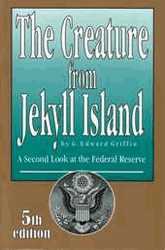This is the twenty-third installment in a series of chapter summaries from G. Edward Griffin’s must-read book The Creature From Jekyll Island. This book may be the most important “red pill” available and we highly recommend that you read the full book. Buy it today at RealityZone.
 |
| Buy Here |
G. Edward Griffin
Activist Post
Congress had been assured that the Federal Reserve Act would decentralize banking power away from Wall Street. However, within a few years of its inception, the System was controlled by the New York Reserve Bank under the leadership of Benjamin Strong whose name was synonymous with the Wall Street money trust.
During the nine years before the crash of 1929, the Federal Reserve was responsible for a massive expansion of the money supply. A primary motive for that policy was to assist the government of Great Britain to pay for its socialist programs which, by then, had drained its treasury. By devaluing the dollar and depressing interest rates in America, investors would move their money to England where rates and values were higher. That strategy succeeded in helping Great Britain for a while, but it set in motion the forces that made the stock-market crash inevitable.
The money supply expanded throughout this period, but the trend was interspersed with short spasms of contraction which were the result of attempts to halt the expansions. Each resolve to use restraint was broken by the higher political agenda of helping the governments of Europe. In the long view, the result of plentiful money and easy credit was a wave of speculation in the stock market and urban real estate that intensified with each passing month.
There is circumstantial evidence that the Bank of England and the Federal Reserve had concluded, at a secret meeting in February of 1929, that a collapse in the market was inevitable and that the best action was to let nature take its course. immediately after that meeting, the financiers sent advisory warnings to lists of preferred customers — wealthy industrialists, prominent politicians, and high officials in foreign governments — to get out of the stock market. Meanwhile, the American people were being assured that the economy was in sound condition.
On August 9, the Federal Reserve applied the pin to the bubble. It increased the bank-loan rate and began to sell securities in the open market. Both actions have the effect of reducing the money supply. Rates on brokers’ loans jumped to 20%. On October 29, the stock market collapsed. Thousands of investors were wiped out in a single day. The insiders who were forewarned had converted their stocks into cash while prices were still high. They now became the buyers. Some of the greatest fortunes in America were made in that fashion.
See other parts below:
PART 1: The Journey to Jekyll Island
PART 2: The Name of the Game is Bailout
PART 3: Protectors of the Public
PART 4: Home, Sweet Loan
PART 5: Nearer to the Heart’s Desire
PART 6: Building the New World Order
PART 7: The Barbaric Metal
PART 8: Fool’s Gold
PART 9: The Secret Science
PART 10: The Mandrake Mechanism
PART 11: The Rothschild Formula
PART 12: Sink the Lusitania!
PART 13: Masquerade in Moscow
PART 14: The Best Enemy Money Can Buy
PART 15: The Lost Treasure Map
PART 16: The Creature Comes to America
PART 17: A Den of Vipers
PART 18: Loaves and Fishes and Civil War
PART 19: Greenbacks and Other Crimes
PART 20: The London Connection
PART 21: Competition is a Sin
PART 22: The Creature Swallows Congress
linkwithin_text=’Related Articles:’


Be the first to comment on "G. Edward Griffin: The Great Duck Dinner"